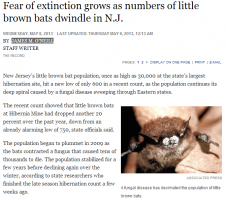 It’s bad news for little brown bats in New Jersey: James O’Neill, staff writer for the NorthJersey.com news, reports on the diminishing bat count in the state. There once were as many as 30,000 of these bats in Jersey’s primary hibernation site, but that number has recently dropped to a new low of 600 as the species continues to be ravaged by a fungal disease called white nose syndrome. In smaller sites, the figures are even more dismal, with areas that were once home to hundreds of bats now barely having any.
It’s bad news for little brown bats in New Jersey: James O’Neill, staff writer for the NorthJersey.com news, reports on the diminishing bat count in the state. There once were as many as 30,000 of these bats in Jersey’s primary hibernation site, but that number has recently dropped to a new low of 600 as the species continues to be ravaged by a fungal disease called white nose syndrome. In smaller sites, the figures are even more dismal, with areas that were once home to hundreds of bats now barely having any.
The fungus and its deadly effects on the bat population were first observed in 2009. It causes bats to develop a white-like powder on their noses, wing membranes, and ears, hence the name “white nose syndrome”. More gravely, this fungus causes the bats to behave erratically, being active when they should be hibernating, thereby use up their stores of body fat, causing them to eventually die of starvation. With so many bats dying from the disease, more people are now aware of the bats’ (and other wild animals’) plight, which has resulted in increased interest for more humane pest control.
Past the death of thousands of bats in the initial years of the fungi’s deadly attack, the population of little brown bats had started to stabilize. Sadly, that trend has recently made a turn for the worse, jeopardizing not only the lives of bats, but the balance of the entire ecosystem. After all, while bats are sometimes shunned as pests, for the most part they are beneficial to the environment.
The importance of bats can be summed up thus: in one night, a single bat can eat up 3,000 insects including, but not limited to, flies, gnats, wasps, moths, and beetles. So don’t be so quick to try and kill a bat that roosts on the roof or another part of your home. It’s true that bats pose health risks and dangers, but this is exactly why you have to call for a professional pest control company such as Skedaddle Humane Wildlife Control just as you would call them to skillfully get rid of skunks, racoons, and other visiting wildlife.
With the North American little brown bat population teetering on the edge of extinction, it becomes more crucial for residents to do their part in helping maintain and restore the numbers of these “pests”. You may not want to keep them around your home because of the risks, but if they die out it would be to everyone’s disadvantage, too.
Pest control companies shouldn’t work against animals; but work, instead, towards the harmonious interaction between wildlife and humans. Companies like Skedaddle employ safe and humane means of removing them from homes without harming them. In the end, it’s a bigger issue than just winged mammals being nuisances around your home; it’s about the balance of the entire ecosystem.


